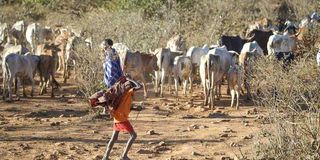Need to protect pastoral lands

Young herders from the indigenous Samburu pastoral community herd their family cattle on January 24, 2017.
The pastoral communities transcending national boundaries are the essence of regional integration in East Africa.
The borderless nature of pastoralism is not just a way of life, but a model for regional cooperation and thus requires policies to embrace and support the cross-border dynamics of pastoralism, recognising the potential in strengthening regional ties. The East Africa Pastoralists Expo that brought together more than 1,200 pastoralists at the Millennium in Addis Ababa, Ethiopia, over the weekend, was an excellent meeting.
Through the Intergovernmental Authority on Development’s Land Governance Unit, the expo focused on the crucial role of land governance in building resilience and securing customary land rights in pastoral areas. With objectives ranging from creating dialogue platforms to mobilising stakeholders for increased investment in land use planning, these sessions underscored the significance of inclusive and participatory approaches in ensuring the sustainability of pastoral livelihoods in the region.
Pastoralists have skills that enable them to adapt to harsh environmental conditions while avoiding resource depletion and ecosystem degradation. However, emerging challenges such as land grabbing and large-scale energy projects threaten these customary land rights and jeopardise their livelihoods.
We need to highlight the importance of participatory land use planning in enhancing rangeland productivity and sustainable livestock systems. Experiences from Dollo Ado in Ethiopia and urban centers of Khalalio, Sala, Rhamu Dimtu and Kiliweheri of Mandera County show successful approaches to inclusive land use planning. We must emphasise the need for multi-disciplinary collaboration and alignment with government policies.
By transforming social norms and empowering marginalised groups, such as women and the youth to access and own land, these initiatives contribute to more equitable and inclusive land governance practices.
Despite their potential as agents of change, the youth have often been excluded from decision-making processes. We must use the youth’s skills in technology and innovation to drive digital transformations in land administration and management.
While governments have made strides in recognising pastoralist land rights, challenges remain in developing tools for documenting and securing these rights, particularly collective rights.
Moving forward, it is imperative to prioritise regional collaboration and coordination in addressing the complex challenges facing pastoralist communities.
- Mr Alio is the CECM Lands, Physical Planning, Housing, Planning, Circular Economy, Solid Waste Management and Sanitation, Mandera County; [email protected].





